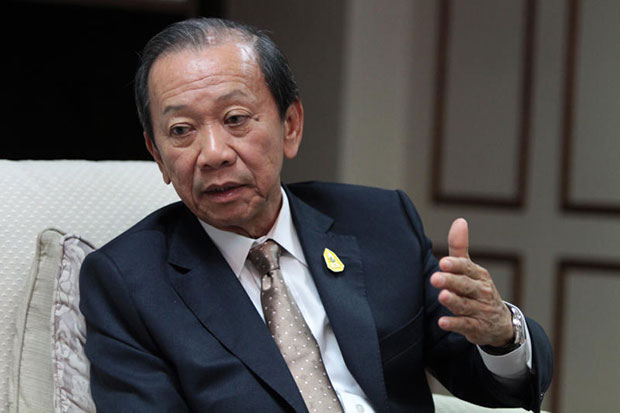SC touts extending foreign leaseholds
SET-listed developer envisages extending leasehold ownership to at least 60 years, which could help attract international buyers, writes Kanana Katharangsiporn
- Published: 18 Jun 2025 at 04:31 9 comments
- WRITER: Kanana Katharangsiporn

Mr Nuttaphong recommends policymakers go beyond low-end incentives and implement broader stimulus measures. Wisuttipong Rodpai
With the residential market expected to contract for at least three years, Thailand should restore foreign tourist confidence to drive economic growth and extend leasehold ownership to at least 60 years to attract international buyers, according to SET-listed developer SC Asset Corporation.
Nuttaphong Kunakornwong, chief executive of SC, said the global economic outlook remains weak, with tourism emerging as one of Thailand's few reliable growth drivers.
However, unlocking the full potential of foreign demand will require targeted government policies.
"Bangkok remains one of the most liveable cities in the world. If we provide the right level of security and assurance for foreign buyers, especially through extended leasehold terms, it could be a game-changer for Thailand's property sector," he said.
Attracting foreign demand is critical, especially as Thailand faces a prolonged period of low population growth, projected to dip below zero within a decade, said Mr Nuttaphong.
"Extending leasehold terms to 60 years or more would offer international investors the confidence they need. Whether it's 60, 90 or even 99 years, the exact terms can be debated. But it must exceed 60 to be meaningful," he said.
While the government has introduced measures such as reduced transfer and mortgage fees for homes priced less than 7 million baht and eased loan-to-value (LTV) ratios, policies directly targeting international demand are still lacking.
Mr Nuttaphong urged policymakers to go beyond low-end incentives and implement broader stimulus measures.
"Around 50% of the market is comprised of homes priced more than 7 million baht. Current policies only target the lower half," he said. "To revive the whole market, we need comprehensive solutions."
SC remains focused on the high-end segment, particularly single-detached houses priced more than 20 million baht, a segment in which the company leads in market share, exhibiting continued strong demand and relatively low mortgage rejection rates.
Still, the overall market is entering what Mr Nuttaphong calls an "ice age", with three major headwinds: a sluggish economy, high household debt and a looming oversupply in the low-rise housing sector.
During the pandemic, demand for low-rise houses in Greater Bangkok soared from around 90 billion baht annually to nearly 200 billion, before settling at 150 billion in recent years.
This surge attracted many developers, leading to oversupply, while luxury units have performed better, the average time to absorb new supply has increased from three years to five.
"Despite recent government efforts to support the sector, recovery remains uneven. We predict the slowdown will persist until at least 2027," he said.
"Developers are now focused on offloading inventory, slowing new investments and preserving liquidity."
To weather the downturn and retain market leadership in the high-end housing segment, SC is relying on a strategy built on a pillar of three "B"s: "Believe" (brand trust), "Buffer" (strong financial reserves) and "Blend" (a diversified portfolio).
The company is shifting more resources into recurring income streams, such as hotels and logistics, while also exploring future growth in wellness-focused services.
Internationally, SC recently acquired five apartment buildings in the US worth more than US$100 million, with occupancy exceeding 95%.
The move is part of a strategy to diversify risk and capture stable rental income in mature markets.
Domestically, SC plans to grow its second and third "engines" -- recurring income and innovation-led services -- to eventually comprise more than 25% of net profit by 2030.
"Diversification is now more powerful than precision. With so many uncertainties, a flexible, multi-engine approach is our path forward," said Mr Nuttaphong.
Attracting foreign demand should not be seen merely as a real estate policy, but as a national economic strategy.
"Thailand needs labour, spending and long-term confidence. Allowing foreigners to settle here with greater assurance is a win for everyone," he said.
"We must act decisively. The housing market alone contributes over 10% to GDP. If it stalls, the ripple effects will be severe. Targeted, time-limited stimulus for foreign buyers could provide the lift we need."



9 people commented about the above
Readers are urged not to submit comments that may cause legal dispute including slanderous, vulgar or violent language, incorrectly spelt names, discuss moderation action, quotes with no source or anything deemed critical of the monarchy. More information in our terms of use.
Please use our forum for more candid, lengthy, conversational and open discussion between one another.
Click here to view more comments